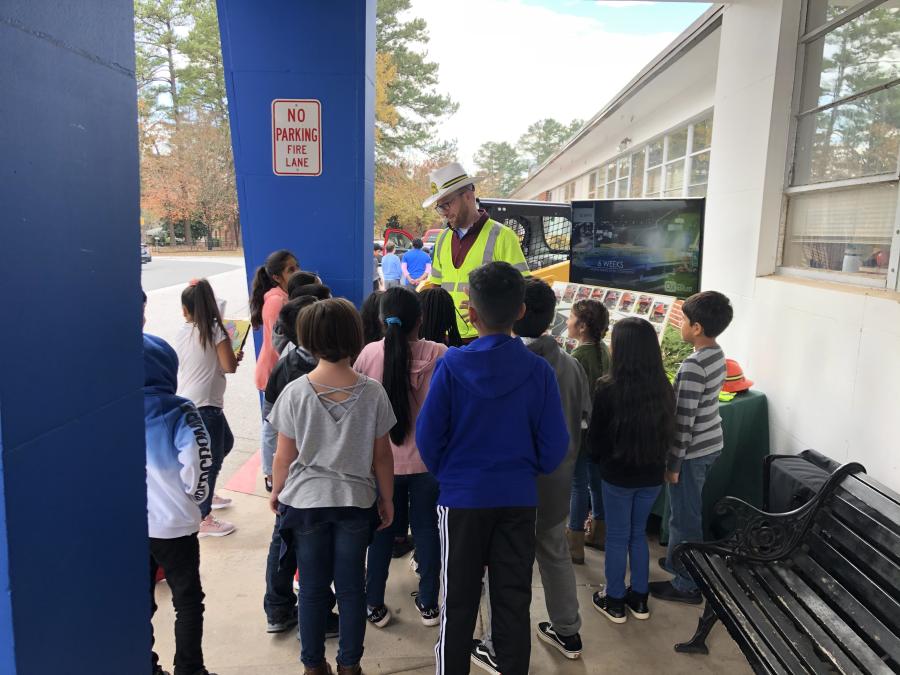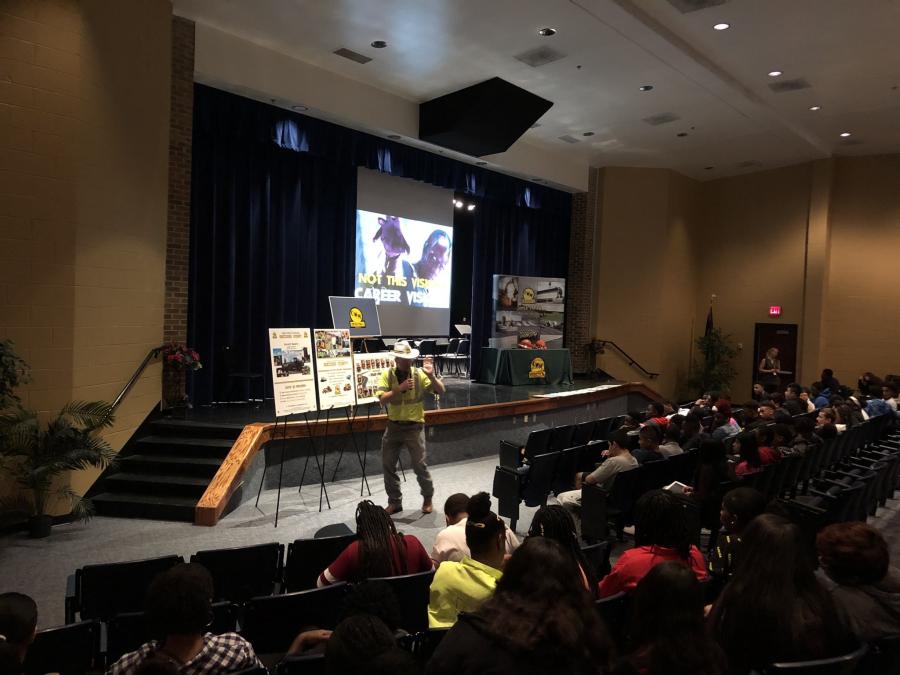Jeremy Whitaker taught construction trades education for seven years before he was hired by C.W. Matthews Contracting Co. Inc. to promote the construction industry in local elementary and high schools.
(Jeremy Whitaker/C.W. Matthews photo)
Jeremy Whitaker taught construction trades education for seven years at Kennesaw Mountain High School in Cobb County, Ga., before he was hired by C.W. Matthews Contracting Co. Inc. last June to promote the construction industry in elementary and high schools as a means to secure much-needed workers for an industry that is experiencing a labor shortage.
His title with C.W. Matthews says it all — Recruitment & Development Manager — and this former teacher is taking his message to students and teachers across the state.
Whitaker recently sat down with Construction Equipment Guide for an interview to describe his efforts and the reception he's received from prospective recruits.
CEG: How would you describe the success of the Georgia Highway Construction Association and C.W. Matthews initiatives to recruit high school students into construction and how would you quantify them?
Whitaker: Right now, we are working with about 20 elementary, middle and high schools around the state to change the narrative. A career in construction is a great option after high school. As a former educator for 15 years, and with three college degrees myself, college is a great option, but that's all it is — not the only option. Students have been told for too long that college is the only real option for a successful future after high school, and that's just totally false. Because of this narrative, we are at a place where only 33 percent of students who start college actually finish, and our country alone has $1.5 trillion in student loan debt, which is more than all credit card debt in our country.

So, the 67 percent of students who start college and don't finish still have all this student loan debt to pay for, with no degree to help them earn a higher wage. The tide has to turn. Students need to know this reality and we need to share with them all the great career opportunities, not job opportunities, there's a big difference, that await them in the construction industry. That's what we are trying to do here at C.W. Matthews.
It's never too early to plant the seed of what we offer to students. That's why we are not only in high schools, but in middle and elementary schools as well. We want to open their eyes and give them a hands-on experience that will hopefully leave a long-term impression that they will remember for years to come. Schools need industry partnerships and we need them, so it just takes us reaching out and taking the time to build that ongoing relationship. We at C.W. Matthews want to be involved in what's going on in the schools — not just at career fairs — because that's where the deep meaningful relationships are made. Also, that's where parents get to know us.
Two ways that we are trying to be a blessing to schools and students is by offering Work Based Learning (WBL) and summer internship opportunities. Right now, we have seven WBL students around the state working for us. As a part of WBL, students go to school for half the day and come work for us the other half. This summer will be our first time to offer summer internships, but I've already began the interview process and have some good candidates. A summer intern must be a rising senior, 17-years old, have a driver's license and most importantly, have a desire to go into construction after high school. So far, the WBL program has been a great success.
CEG: What are you hearing from students and parents?
Whitaker: When I go into schools, I see lots of students who are interested in working in construction and for C.W. Matthews, however, getting their parents on board is a different thing. Parents want what is best for their children, and most parents think that college is the best option. However, knowledge is power, and when parents don't have the knowledge of the great opportunities for their children in construction, they don't have the power to make the best decision for them. So as much as I can, I try to meet with parents to tell them of the paths to success and advancement in our industry so we can change the narrative that college is not the only option after high school. When I tell parents how much money their child can make, how we will train them while they are getting paid, and offer retirement and health benefits, it begins to turn some heads.
CEG: What are some of the inspiring moments that spur you on?
Whitaker: Oscar Simmons, a senior construction program student at Jones County High School in the Macon area, is one of my WBL students who now works at our Bolingbroke asphalt plant. He has done a phenomenal job, and because of his attitude and work ethic, he already has a career position lined up for himself after graduation. Oscar said he is very grateful for the work-based learning program, and construction class for giving him an opportunity to achieve his dream and find his career job. I'm so happy that I played a part in him reaching his dreams.
CEG: Do you have a universal approach or are there separate pitches for boys and girls?
Whitaker: No, I give the same pitch to boys and girls. I have a poster I bring with me showing the faces of the high school students that I've recently hired, and I make sure I point out the female on there so girls will know that we are looking for them as well in our industry. Women are excelling in construction. We just have to work harder to overcome the stereotype that construction is just for men.
CEG: What additional methods and actions could be taken to recruit more students and would federal and state financial support for construction and trades-oriented programs and initiatives help?
Whitaker: More support for high school construction programs would help a lot. This is where we find the majority of our candidates that have an aptitude for our line of work. If the programs are not available in the high school, so many kids will just drift by with all that untapped potential being lost to us. If you want good fruits, you must focus on the roots. That is why we call our education initiative "Roots to Fruits." Building relationships with schools, teachers, students and parents from an early stage prior to graduation is essential to changing the narrative from what it is today, to what it needs to be in that construction, specifically heavy highway construction, is a great career choice after high school. CEG
Irwin Rapoport
A journalist who started his career at a weekly community newspaper, Irwin Rapoport has written about construction and architecture for more than 15 years, as well as a variety of other subjects, such as recycling, environmental issues, business supply chains, property development, pulp and paper, agriculture, solar power and energy, and education. Getting the story right and illustrating the hard work and professionalism that goes into completing road, bridge, and building projects is important to him. A key element of his construction articles is to provide readers with an opportunity to see how general contractors and departments of transportation complete their projects and address challenges so that lessons learned can be shared with a wider audience.
Rapoport has a BA in History and a Minor in Political Science from Concordia University. His hobbies include hiking, birding, cycling, reading, going to concerts and plays, hanging out with friends and family, and architecture. He is keen to one day write an MA thesis on military and economic planning by the Great Powers prior to the start of the First World War.
Read more from Irwin Rapoport here.
Today's top stories
















